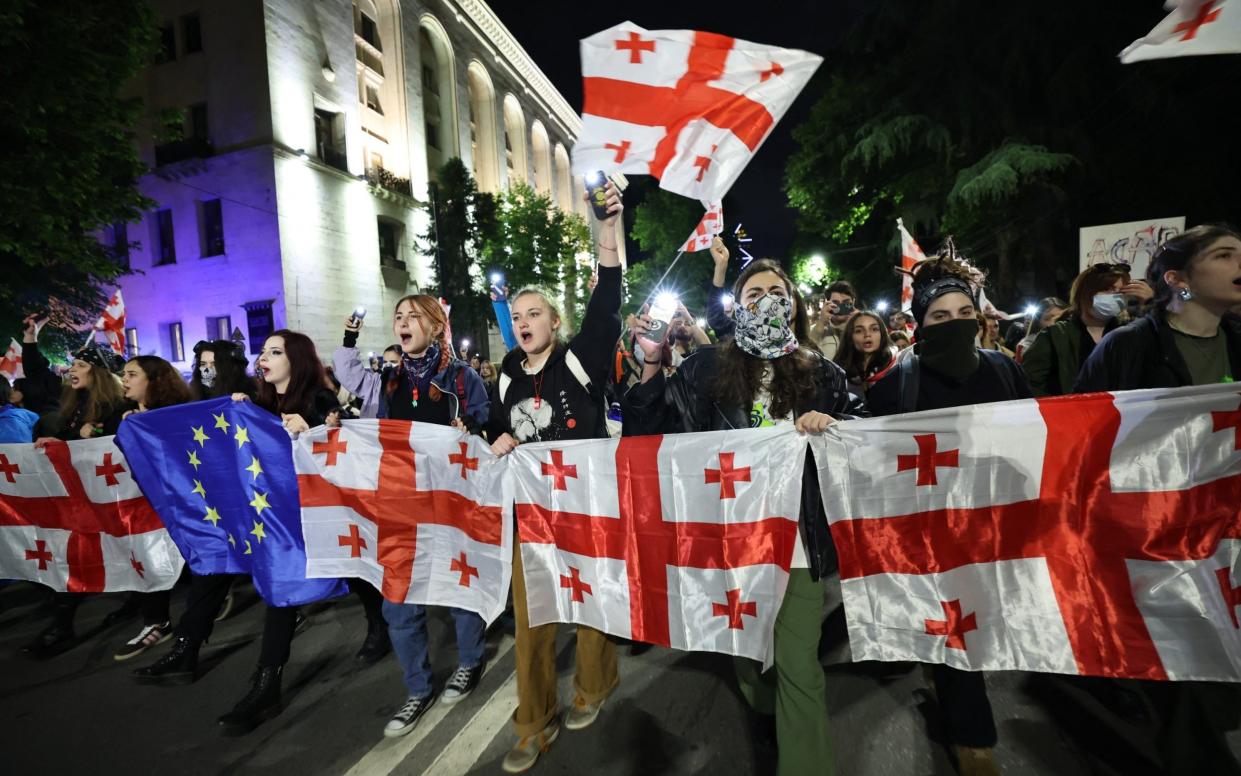The EU is failing Georgia, just as it failed Ukraine

- Oops!Something went wrong.Please try again later.
In the mental world inhabited by Putin apologists, the West is always seeking to destabilise and overthrow Moscow-friendly regimes. The most recent example is mass protests in Georgia, blamed by its leaders on a “global war party” seeking to keep Georgia in the Western orbit and risking increased hostilities between the two power blocs.
If only the West were so forward-thinking. The truth is more straightforward: Georgians have a very good reason to be in the streets ever since the governing party passed a Russian-style foreign agent law that will impose onerous disclosure requirements on all non-governmental organisations with as little as 20 percent of their revenue coming from abroad.
Unlike last year, when the government retracted the bill under public pressure, the ruling Georgian Dream party has now vowed to stay the course and to use its majority to break the veto of the country’s president, Salome Zourabichvili.
Contrary to the allegations made by Georgian Dream’s Russia-aligned leader, Bidzina Ivanishvili, Washington and Brussels are most certainly not behind the protests that have brought hundreds of thousands of particularly young Georgians to the streets.
If anything, the collective West is conspicuous by its absence.
Whilst the European Parliament may be now be calling on the Georgian government to scrap the law, calling it “incompatible” with European values, in December last year the European Council granted Georgia candidate status, even though the country had already veered far off the path followed by other Eastern European candidates: Moldova and Ukraine.
The US Department of State, meanwhile, is likewise “deeply troubled by the actions taken against those protesting against the draft law and the actions taken to advance it,” without any hint of how the United States may respond, if at all.
This inaction is confusing given both the United States and the EU have a lot of leverage. 80 percent of Georgians support joining the EU – a goal to which the government itself remains nominally committed. A credible threat of suspending Georgia’s candidate status would be a game changer, as would sanctions and travel bans against government officials and parliamentarians who derailed Georgia’s path to the West.
More importantly, Europeans and Americans must be ready to manage the fluid politics set in motion by the protests, not unlike in Ukraine in 2013 and 2014, when a tacitly pro-Russian government similarly reneged on its European commitments.
Those who died at Kyiv’s Maidan protests in 2013 and 2014 expected that the EU and the US would help with the transition into the post-Yanukovych’ era – and the West delivered, albeit in part. A visit to Kyiv by the foreign ministers of Germany, France, and Poland helped diffuse the tensions and facilitated the departure of the much-hated president in February 2014. Last week, Gabrielius Landsbergis of Lithuanian, together with the foreign ministers of Estonia, Latvia, and Iceland, made the trip to Tbilisi. Yet, commendable as the effort was, moving the needle will require the involvement of bigger European players – and also of the Biden administration.
Truthfully, however, it is hard to see Western support for post-Yanukovych’s Ukraine as an unambiguous success. Yes, Ukraine is now negotiating its accession to the EU. Yet, for all its commitment to Ukraine’s European future, the West has been unwilling or unable to protect it against a predictable Russian backlash, which started with the annexation of Crimea and the war in the Donbas. Instead of real security guarantees, Ukraine was presented with the shambolic Minsk Accords, setting the stage for the full-scale Russian invasion in 2022.
With Russia embroiled in its war against Ukraine, Georgia’s mass protests provide an opportunity to finally anchor the country in the West – a move that a vast majority of Georgians would support without any qualifications. Yet, making such a resolution stick would hinge on a combination of a Russian defeat in Ukraine and the West’s tangible support to Georgia’s defences, ideally through NATO membership.
If that sounds fanciful, it is a reflection of just how low America’s and the West’s ambitions have fallen. There is no reason why Russia, an economy of the size of Italy’s, should have a veto over the political choices made by its neighbours – indeed, the whole point of helping Ukraine defend itself against Putin’s aggression is to make it clear that imperial domination has no place in the 21st century. Allowing it to take root in Georgia, through inaction or fecklessness, would be a tragedy.
Dalibor Rohac is a senior fellow at the American Enterprise Institute in Washington DC

